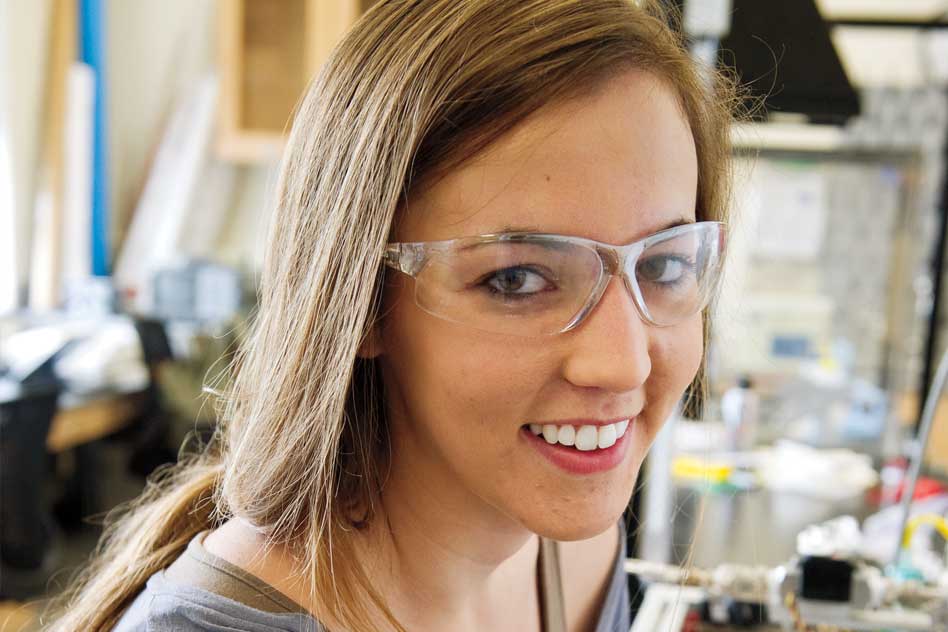
Tasked with finding paid international internships for MIT students at all levels, MIT-France Program Manager Erin Baumgartner welcomes a growing partnership with the MIT Energy Initiative (MITEI). As increasing numbers of students gravitate toward energy and environment studies, says Baumgartner, “being able to work with MITEI on placing interns and finding excellent innovative projects for students makes my job so much easier.” An early beneficiary of the burgeoning collaboration between MITEI and the MIT-France Program is Anna (Kate) Kelly ’12 of the Department of Civil and Environmental Engineering, who spent the summer of 2011 working as an intern for Électricité de France.
Several intense semesters of French, not to mention hours streaming French movies on Netflix, helped make Anna (Kate) Kelly’s internship last summer with Électricité de France (EDF), Europe’s largest utility and a member of the MIT Energy Initiative, an “overwhelmingly positive experience”—one that she believes has already made an impact on her academic and career track.
Kelly ’12, an environmental engineering major, was one of 100 students who qualified for a fully paid internship abroad through the MIT-France Program, part of the MIT International Science and Technology Initiatives (MISTI). After meeting an EDF representative at an information session, Kelly was intrigued. The company’s sample research project descriptions clinched it for her: “Based on my coursework, I knew I was well qualified and could fit in there.”
After a competitive selection and interviewing process, Kelly was accepted by EDF for a three-month position in Paris. With other Francebound students, she participated in MISTI’s brisk training regimen in French politics, history, culture, and such routine but crucial matters as opening a bank account and dealing with medical emergencies.
EDF’s lab, located on an island in the Seine, was engaged in fluid dynamics modeling, work that Kelly at first found “incredibly theoretical.” Her supervisor tasked her with running software simulations of experiments involving circular flow of fluids in a cavity, part of a broader research effort aimed at improved understanding of turbulence-structure interaction—work that might someday enhance nuclear power plant cooling and ocean-based green energy projects. “I chose mathematical models that best matched the data and that were most computationally efficient,” she says. This kind of research was a far cry from Kelly’s experience working for Chevron in Houston, Texas, the previous summer, where she investigated groundwater vapor intrusions from leaking oil storage tanks and helped restore refinery sites into wildlife habitat.
Kelly, who typically “prefers doing work that has immediate applications,” nevertheless found her French lab assignment absorbing. She also appreciated opportunities to explore other EDF research and business ventures. She was invited to tour the construction site of the utility giant’s European Pressurized Reactor, the first nuclear facility of its kind in France, and the plant’s environmental engineers talked to her about applying for a job. She also came to appreciate the French attitude toward energy: “I was impressed by how it’s not a political issue, just a matter of fact that we need alternatives to coal and oil.”
As the summer wore on, lab work progressed, and the pleasures of Paris grew on her, she decided to extend her time in France and won acceptance to the prestigious École Polytechnique for a fall semester of environmental physics and climate and radiation dynamics.
Back for her final semester at MIT, Kelly is determined to build on her overseas work/study experience. She plans to pursue a master’s degree in environmental and water quality engineering, and figures that her work in computational flow dynamics will help. Later, she envisions a career in international energy policy. She will serve as an ambassador to the next round of MIT-France interns, a pool that may significantly expand in the context of the recent partnership between MIT and the French Ministry of Higher Education and Research focused on energy projects. To her classmates considering time abroad, Kelly advises, “Absolutely do it. It is unlike anything else you can do with your summer.”
This article appears in the Spring 2012 issue of Energy Futures.